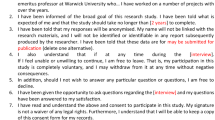Abstract
Awareness of research paradigms has been recognised as a prized asset to educational researchers. Yet, the extent to which philosophical stances tend to be reflected in papers remains enigmatic in ELT research. This study was, therefore, conducted to explore whether methodologies adopted by ELT researchers are underpinned by pertinent philosophical assumptions. In particular, it enquired into authors’ explicit reference to philosophical underpinnings of their research. In so doing, based on a set of rigorous criteria, a search of relevant articles was undertaken, culminating in 53 articles published in 24 journals, spanning five years (2015–2019). The results testified to researchers’ reluctance to engage with philosophical assumptions, inasmuch as only a small proportion of articles (7.5%) discussed the underpinning philosophical assumptions. The results, however, showed that ethical considerations appear to be a well-established phenomenon, of which the majority of researchers (60.4%) took heed. Moreover, the adopted word cloud technique introduced the highly frequent words used in the methods sections. The results are imbued with some implications for ELT researchers and academics.




Similar content being viewed by others
References
Bryman, A. (2012). Social research methods (4th ed.). Oxford: Oxford University Press.
Cohen, L., Manion, L., & Morrison, K. (2018). Research methods in education (8th ed.). New York, NY: Routledge.
Creswell, J. W. (2007). Qualitative inquiry and research design: Choosing among five approaches (2nd ed.). Thousand Oaks, CA: SAGE Publications.
Creswell, J. W. (2012). Educational research: Planning, conducting, and evaluating quantitative and qualitative research (4th ed.). Boston: Pearson Education.
Creswell, J. W. (2013). Qualitative inquiry and research design: Choosing among five approaches. Thousand Oaks, CA: SAGE Publications.
Crotty, M. (1998). The foundations of social research: Meaning and perspective in the research process. London: Sage.
Denzin, N. K., & Lincoln, Y. S. (2005). Paradigms and perspectives in contention. In N. K. Denzin & Y. S. Lincoln (Eds.), The Sage handbook of qualitative research (3rd ed., pp. 183–190). Thousand Oaks, CA: Sage.
Denzin, N. K., & Lincoln, Y. S. (2018). Paradigms and perspectives in contention. In N. K. Denzin & Y. S. Lincoln (Eds.), The sage handbook of qualitative research (5th ed., pp. 195–212). Thousand Oaks, CA: Sage.
Dörnyei, Z. (2007). Research methods in applied linguistics: Quantitative, qualitative, and mixed methodologies. Oxford: Oxford University Press.
Gall, M. D., Gall, J. P., & Borg, W. R. (2003). Educational research: An introduction (7th ed.). Boston, MA: Pearson Education.
Gilbert, T. (2006). Mixed methods and mixed methodologies: The practical, the technical and the political. Journal of Research in Nursing, 11(3), 205–217.
Gough, D., Oliver, S., & Thomas, J. (2012). Introducing systematic reviews. In D. Gough, S. Oliver, & J. Thomas (Eds.), An introduction to systematic reviews (pp. 1–16). London: SAGE Publications.
Guba, E. G., & Lincoln, Y. S. (1994). Competing paradigms in qualitative research. In N. K. Denzin & Y. S. Lincoln (Eds.), Handbook of qualitative research (pp. 105–117). Thousand Oaks, CA: Sage.
Hammersley, M. (2003). Can and should educational research be educative? Oxford Review of Education, 29(1), 3–25.
Hammersley, M. (2006). Philosophy’s Contribution to Social Science Research on Education. Journal of Philosophy of Education, 40(2), 273–286. https://doi.org/10.1111/j.1467-9752.2006.00504.x.
Howe, K. R. (2003). Closing methodological divides: Toward democratic educational research. Dordrecht: Kluwer Academic Publishers.
Jesson, J., Matheson, L., & Lacey, F. M. (2011). Doing your literature review: Traditional and systematic techniques. London: Sage.
Johnson, R. B., Onwuegbuzie, A. J., & Turner, L. A. (2007). Toward a definition of mixed methods research. Journal of Mixed Methods Research, 1(2), 112–133. https://doi.org/10.1177/1558689806298224.
Leavy, P. (2017). Research design: Quantitative, qualitative, mixed methods, arts-based, and community-based participatory research approaches. New York, NY: The Guilford Press.
Mas-Tur, A., Modak, N. M., Merigó, J. M., Roig-Tierno, N., Geraci, M., & Capecchi, V. (2019). Half a century of quality & quantity: A bibliometric review. Quality & Quantity, 53(2), 981–1020. https://doi.org/10.1007/s11135-018-0799-1.
Mazandarani, O. (2020). The status quo of L2 vis-à-vis general teacher education. Educational Studies. https://doi.org/10.1080/03055698.2020.1729101.
McNaught, C., & Lam, P. (2010). Using wordle as a supplementary research tool. The Qualitative Report, 15(3), 630–643.
Mingers, J. (2001). Combining IS research methods: Towards a pluralist methodology. Inf Syst Res, 12(3), 240–259.
Oakley, A. (2012). Foreword. In D. Gough, S. Oliver, & J. Thomas (Eds.), An introduction to systematic reviews (pp. vii–x). London: SAGE Publications.
Pring, R. (2000). Philosophy of educational research (2nd ed.). London: Continuum.
Pring, R. (2001). The virtues and vices of an educational researcher. J Philos Educ, 35(3), 407–421. https://doi.org/10.1111/1467-9752.00235.
Smith, B., & McGannon, K. R. (2018). Developing rigor in qualitative research: Problems and opportunities within sport and exercise psychology. Int Rev Sport Exerc Psychol, 11(1), 101–121. https://doi.org/10.1080/1750984X.2017.1317357.
Traianou, A. (2014). The centrality of ethics in qualitative research. In P. Leavy (Ed.), The Oxford handbook of qualitative research (pp. 62–77). New York, NY: Oxford University Press.
United Nations Statistics Division. (n.d.). Geographic regions. Retrieved February, 28, 2020, from https://unstats.un.org/unsd/methodology/m49/.
Yonezawa, A., Kitamura, Y., Meerman, A., & Kuroda, K. (2014). The emergence of international dimensions in East Asian higher education: Pursuing regional and global development. In A. Yonezawa, Y. Kitamura, A. Meerman, & K. Kuroda (Eds.), Emerging international dimensions in East Asian higher education (pp. 1–13). Dordrecht: Springer.
Author information
Authors and Affiliations
Corresponding author
Additional information
Publisher's Note
Springer Nature remains neutral with regard to jurisdictional claims in published maps and institutional affiliations.
Rights and permissions
About this article
Cite this article
Mazandarani, O. Philosophical Assumptions in ELT Research: A Systematic Review. Asia-Pacific Edu Res 31, 217–226 (2022). https://doi.org/10.1007/s40299-021-00554-0
Accepted:
Published:
Issue Date:
DOI: https://doi.org/10.1007/s40299-021-00554-0




